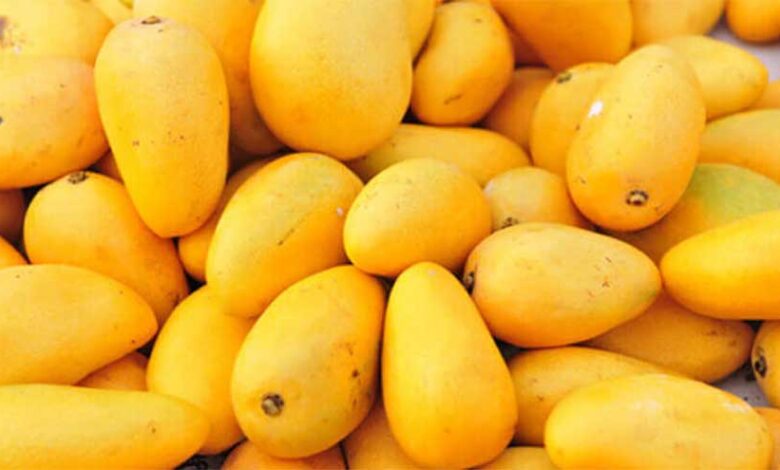Pakistan establishes an objective of exporting 125,000 tons of mangoes to the Middle East.

A prominent association of Pakistani fruit exporters announced on Wednesday its ambitious goal of selling 125,000 tons of mangoes from May to September this year, aiming to generate $100 million in cash, with the intention of directing 70 percent of these exports to Middle Eastern markets.
Pakistan ranks as the fourth-largest producer of mangoes globally, with fruit exports yielding millions of dollars in annual revenue, as reported by the Pakistan Fruit and Vegetables Export Association (PFVEA).
Pakistan’s 20 types of mangoes are second to oranges in terms of fruit production in the country. The nation cultivates approximately 1,800,000 metric tons of mangoes each year, with 70 percent originating from Punjab, 29 percent from Sindh, and 1 percent from Khyber Pakhtunkhwa.
Waheed Ahmed, Patron-in-Chief of PFVEA, said Arab News that Pakistan intends to export 125,000 tons of mangoes this season, representing a 25 percent increase over last year’s target of 100,000 tons. Exports commenced on May 25 and will persist until the end of September.
“We aim to export 70 percent of this target to Middle Eastern nations, our primary market, and if successful, the country is projected to generate approximately $100 million in foreign exchange,” he stated.
Ahmed cautioned that the detrimental consequences of climate change may influence Pakistan’s mango production this year.
Pakistan, experiencing erratic weather phenomena such as heatwaves and excessive rainfall, has consistently ranked among the nations most severely impacted by the consequences of climate change.
Mango production in Pakistan has decreased for the past three straight years.
Ahmed cautioned that mango production in Pakistan is steadily decreasing owing to climate change and water constraint, with a potential drop of up to 25 percent in overall mango output this year.
Following the anticipated decrease, the PFVEA official indicated that this season’s overall mango production may diminish to approximately 1.4 million tons.
“Nevertheless, we have augmented the export target, as we are currently exporting merely 125,000 tons out of the projected 1.4 million tons; thus, we remain optimistic about attaining it despite the challenges,” stated Ahmed.
Ahmed advocated for measures including enhanced water management, the cultivation of climate-resilient mango types, research and development, and the modernization of agriculture and horticulture.
He stated that initiatives were in progress to enhance mango exports to non-traditional countries, including Japan, the United States, South Korea, and Australia, with particular emphasis on increasing shipments to Turkiye and China.
He observed that regional tensions, specifically the conflict between Pakistan and India as well as the tensions between Israel and Iran, have resulted in increased export costs due to supplementary fees imposed by shipping companies on Pakistani cargo.
“We urge the Federal Ministry of Commerce and the Ministry of Maritime Affairs to intervene and eliminate these extra charges to help improve export competitiveness,” Ahmed said.
Farmers and exporters agreed adverse climate conditions had affected not only the volume of production but also the quality of mangoes.
“We have been facing losses due to multiple factors, including low yield and lower-than-expected demand caused by conflicts in the Middle East,” Asif Ahmed, an exporter from Iftikhar Ahmed & Co, told Arab News.
Asif, who has been exporting mangoes for over six decades, hoped the Iran-Israel ceasefire would improve the situation and that fruit prices would rise to help cover the losses.
“We have farms in Sindh’s Tando Allahyar and Mirpur Khas districts where production was almost around 30 percent less than normal this year,” Asif said.